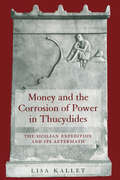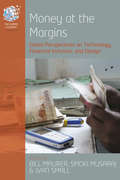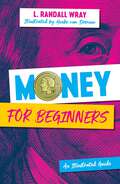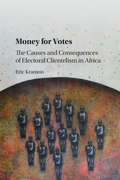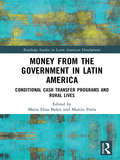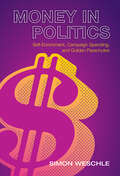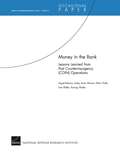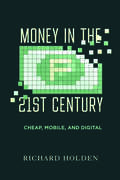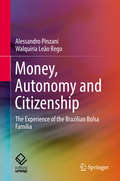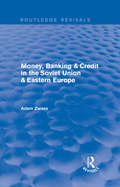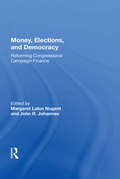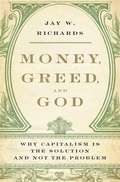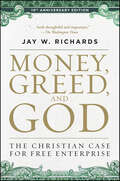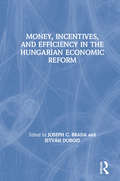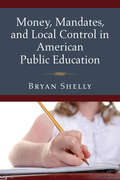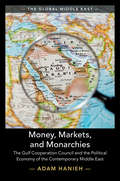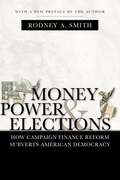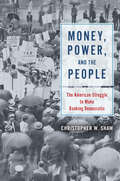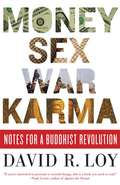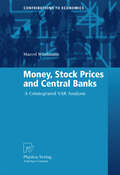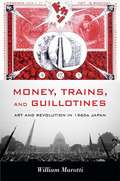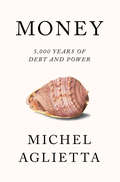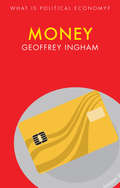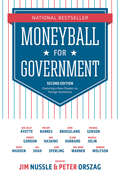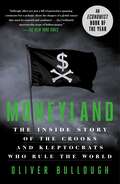- Table View
- List View
Money and the Corrosion of Power in Thucydides: The Sicilian Expedition and Its Aftermath
by Lisa KalletWealth and power are themes that preoccupy much of Greek literature from Homer on, and this book unravels the significance of these subjects in one of the most famous pieces of narrative writing from classical antiquity. Lisa Kallet brilliantly reshapes our literary and historical understanding of Thucydides' account of the disastrous Sicilian expedition of 415–413 b.c., a pivotal event in the Peloponnesian War. She shows that the second half of Thucydides' History contains a damning critique of Athens and its leaders for becoming corrupted by money and for failing to appropriately use their financial strength on military power. Focusing especially on the narrative techniques Thucydides used to build his argument, Kallet gives a close examination of the subjects of wealth and power in this account of naval war and its aftermath and locates Thucydides' writings on these themes within a broad intellectual context. Among other topics, Kallet discusses Thucydides' use of metaphor, his numerous intertextual references to Herodotus and Homer, and thematic links he makes among the topics of money, emotion, and sight. Overall, she shows that the subject of money constitutes a continuous thematic thread in books six through eight of the History. In addition, this book takes a fresh look at familiar epigraphic evidence. Kallet's ability to combine sophisticated literary analysis with a firm grasp of Attic inscriptions sheds new light on an important work of antiquity and provides a model example of how to unravel a dense historical text to reveal its underlying literary principles of construction.
Money at the Margins: Global Perspectives on Technology, Financial Inclusion, and Design (The Human Economy #6)
by Bill Maurer Smoki Musaraj Ivan SmallMobile money, e-commerce, cash cards, retail credit cards, and more—as new monetary technologies become increasingly available, the global South has cautiously embraced these mediums as a potential solution to the issue of financial inclusion. How, if at all, do new forms of dematerialized money impact people’s everyday financial lives? In what way do technologies interact with financial repertoires and other socio-cultural institutions? How do these technologies of financial inclusion shape the global politics and geographies of difference and inequality? These questions are at the heart of Money at the Margins, a groundbreaking exploration of the uses and socio-cultural impact of new forms of money and financial services.
Money for Beginners: An Illustrated Guide
by L. Randall WrayMoney is mysterious. We love it, we hate it, but few people can tell you what the heck it really is. Wouldn’t it be good to get out of the fog? This book will help you understand both the way money works and how to leverage its power. The authors take you on an illuminating journey from your piggy bank to the Federal Reserve with no pesky jargon or complex math. Once you see money clearly, life will never be the same. You’ll know what really goes on in banks and what the cash in your wallet represents. You’ll know how government really spends and why it can’t run out of money. You’ll know what money can actually do — and how we can make it work for us.
Money for Votes: The Causes and Consequences of Electoral Clientelism in Africa
by Eric KramonPoliticians distribute money to voters during campaigns in many low-income democracies. Many observers call this practice 'vote buying'. Money for Votes develops an alternative theory of electoral clientelism that emphasizes the role of monetary handouts in conveying information to voters, helping politicians enhance the credibility of their promises to deliver development resources and particularistic benefits to their constituents. Supported by interviews, experiments, and surveys in Kenya, and additional evidence from qualitative and survey data from elsewhere in Africa, the study tests the implications of this argument, and traces the consequences of electoral clientelism for voter behaviour, ethnic politics, public goods provision, and democratic accountability. Ultimately, the book suggests that the relationship of electoral clientelism to the quality of democracy is far more nuanced than our instincts might suggest.
Money from the Government in Latin America: Conditional Cash Transfer Programs and Rural Lives (Routledge Studies in Latin American Development)
by Martin Fotta Maria Elisa BalenIt has been almost two decades since conditional cash transfer programs first appeared on the agendas of multilateral agencies and politicians. Latin America has often been used as a testing ground for these programs, which consist of transfers of money to subsections of the population upon meeting certain conditions, such as sending their children to school or having them vaccinated. Money from the Government in Latin America takes a comparative view of the effects of this regular transfer of money, which comes with obligations, on rural communities. Drawing on a variety of data, taken from different disciplinary perspectives, these chapters help to build an understanding of the place of conditional cash transfer programsin rural families and households, in individuals’ aspirations and visions, in communities’ relationships to urban areas, and in the overall character of these rural societies. With case studies from Chile, Mexico, Peru, Brazil and Colombia, this book will interest scholars and researchers of Latin American anthropology, sociology, development, economics and politics.
Money in Politics: Self-enrichment, Campaign Spending, And Golden Parachutes
by Simon WeschleIn politics, money is often the name of the game. Politicians enrich themselves while in office, spend campaign money to finance their re-election, and accept lucrative 'golden parachute' jobs after leaving office. Money in Politics argues that these different forms of capital are part of a common system and should be analyzed in a single framework. The book advances a comparative theory that shows how self-enrichment, campaign spending, and golden parachute jobs are connected to each other. This theory explains when and how money enters politics, ultimately illuminating that a change in one form affects the other types and revealing the consequences this has for democracy. The book uses a wide range of evidence from countries around the world, including causally identified quantitative studies, qualitative cross-national comparisons, and original survey experiments. Enlightening and instructive, this book shows that we can only fully comprehend the role of money in politics when we view it as a common system to be analyzed and critiqued.
Money in the Bank: Lessons Learned from Past Counterinsurgency (COIN) Operations
by Peter Chalk Angel Rabasa Ivan Khilko Lesley Anne Warner Paraag ShuklaSix historic counterinsurgency (COIN) operations are examined to determine which tactics, techniques, and procedures led to success and which to failure. The Philippines, Algeria, Vietnam, El Salvador, Jammu and Kashmir, and Colombia were chosen for their varied characteristics relating to geography, historical era, outcome, type of insurgency faced, and level of U.S. involvement. Future U.S. COIN operations can learn from these past lessons.
Money in the Twenty-First Century: Cheap, Mobile, and Digital
by Prof. Richard HoldenAn economist examines three modern forces that have redefined what "money" means, who controls it, and what the future of finance might look like. Money is increasingly cheap, digital, and mobile. In Money in the Twenty-First Century, economist Richard Holden examines the virtues and risks of low interest rates, mobile money, and cryptocurrencies, and explains how these three elemental forces will continue to play out—in our wallets, on the blockchain, and throughout major economies—in the decades to come. Holden weaves in the stories of three people who have exerted massive influence over the future of modern money: US treasury secretary Janet Yellen, Ethereum cofounder Vitalik Buterin, and Raghuram Rajan, former governor of the Reserve Bank of India and chief economist at the International Monetary Fund. Moving from micro to macro, Holden investigates the infrastructure that permits digital transactions, the currencies that underpin them, the race for control of those currencies, shifts in policy and the international monetary system, and the impact on our politics of money in the digital age. Ultimately, Money in the Twenty-First Century asks if governments can keep these three tectonic powers of low interest rates, mobile money, and decentralized finance under control.
Money, Autonomy and Citizenship: The Experience of the Brazilian Bolsa Família
by Alessandro Pinzani Walquiria Leão RegoThis book analyzes the impacts on peoples’ lives of the largest antipoverty social program in the world: the Brazilian Bolsa Família Program. Created by the government of former Brazilian president Luiz Inácio Lula da Silva, Bolsa Família has been for a time the largest conditional cash transfer program in the world, serving more than 50 million Brazilians who had a monthly per capita income of less than USD 50. The program is regarded as one of the key factors behind the significant poverty reduction Brazil experienced during the first decade of the 21st century. Bolsa Família is neither a credit scheme nor a loan. It is a program of civic inclusion: it aims to help citizens meet their most basic needs and sometimes just to survive. Its goal is to create citizenship, not to merely train the entrepreneurial spirit. Having this in mind, the authors of this book spent five years (2006-2011) interviewing more than 150 women registered in the program to see how the cash transfers impacted their everyday lives. The authors concluded that the program produces significant social impacts in the beneficiaries’ lives by increasing their levels of moral, economic and political autonomy, promoting citizenship. Money, Autonomy and Citizenship - The Experience of the Brazilian Bolsa Família will be of interest to both academic researchers and public agents involved with the study, development and implementation of public policies aimed at reducing poverty and promoting social justice.
Money, Banking & Credit in the soviet union & eastern europe (Routledge Revivals)
by Adam ZwassThis title was first published in 1979. Essential information for understanding a credit system that is different from that of the 'Capitalist' countires and which has envolved into an integral and essential part of 'soviet- type economies'. Dr Zwass has done a workman-like job in providing another valuable contribution to our knowledge of economies of eastern europe- George Garvy.
Money, Elections, And Democracy: Reforming Congressional Campaign Finance
by Margaret Latus Nugent John R. JohannesThis book is concerned with how the system of congressional campaign financing and proposals for its reform affect key values. It focuses on specific problems with the sources of campaign funds, undesirable consequences of the campaign finance system, and difficulties with reforming the system.
Money, Greed, and God
by Jay W. RichardsDoes capitalism promote greed? Can a person follow Jesus's call to love others and also support capitalism? Was our recent economic crisis caused by flaws inherent to our free market system? Jay Richards presents a new approach to capitalism, revealing how it's fully consistent with Jesus's teachings and the Christian tradition, while also showing why this system is our best bet for renewed economic vigor. The church is bombarded with two competing messages about money and capitalism: wealth is bad and causes much of the world's suffering wealth is good and God wants you to prosper and be rich Richards exposes these myths, and other common misconceptions about capitalism, and reveals the surprising ways that capitalism is, in fact, the best system to respond to the biblical mandates of alleviating poverty and protecting the environment. Money, Greed, and God equips readers to take practical steps in their own lives to conduct business, worship God, and serve others without falling into the "prosperity gospel" trap.
Money, Greed, and God: The Christian Case for Free Enterprise
by Jay W. RichardsA prominent scholar reveals the surprising ways that capitalism is actually the best way to follow Jesus’s mandates to alleviate poverty and protect our earth.Christianity generally sees capitalism as either bad because it causes much of the world’s suffering, or good because God wants you to prosper and be rich. But there is a large, growing audience of evangelical and mainline Christians who are deeply uneasy about how to follow Jesus’s mandate to care for the poor and the environment while living with the excesses of capitalism.Now, a noted Christian scholar argues that there is a middle view that reveals Christianity cannot only accommodate capitalism, but Christian theology can help explain why capitalism works. By highlighting the most common myths committed by Christians when thinking about economics, such as “capitalism is based on greed and over consumption” or “if someone becomes rich that automatically means someone else will become poor,” Money, Guilt, and God equips readers to take practical steps in their own lives to conduct business, worship God, and serve others without falling into the “prosperity gospel” trap.
Money, Incentives and Efficiency in the Hungarian Economic Reform
by Joseph C. Brada Istvan DoboziThe essays in this volume document the serious shortcomings of the Hungarian economic reform, which in two decades has brought deteriorating economic performance, declining real wages, a fiscal deficit and severe inflationary pressures. It has proved unexpectedly difficult to substitute a regulated market economy for a centrally planned one. The authors of these essays argue that the problems stem from the incompleteness of the reforms and their compromise character. Today, as the Hungarians prepare to implement more radical measures, constraining the Communist party and rolling back state ownership, they do so under economically difficult conditions.
Money, Mandates, and Local Control in American Public Education
by Bryan ShellyPointing to the disparities between wealthy and impoverished school districts in areas where revenue depends primarily upon local taxes, reformers repeatedly call for the centralization of school funding. Their proposals meet resistance from citizens, elected officials, and school administrators who fear the loss of local autonomy. Bryan Shelly finds, however, that local autonomy has already been compromised by federal and state governments, which exercise a tremendous amount of control over public education despite their small contribution to a school system's funding. This disproportionate relationship between funding and control allows state and federal officials to pass education policy yet excuses them from supplying adequate funding for new programs. The resulting unfunded and underfunded mandates and regulations, Shelly insists, are the true cause of the loss of community control over public education. Shelly outlines the effects of the most infamous of underfunded federal mandates, the No Child Left Behind Act of 2001 (NCLB), and explores why schools implemented it despite its unpopularity and out-of-pocket costs. Shelly's findings hold significant implications for school finance reform, NCLB, and the future of intergovernmental relations.
Money, Markets, and Monarchies: The Gulf Cooperation Council and the Political Economy of the Contemporary Middle East (The Global Middle East #4)
by Adam HaniehFramed by a critical analysis of global capitalism, this book examines how the six states of the Gulf Cooperation Council are powerfully shaping the political economy of the wider Middle East. Through unprecedented and fine-grained empirical research - encompassing sectors such as agribusiness, real estate, finance, retail, telecommunications, and urban utilities - Adam Hanieh lays out the pivotal role of the Gulf in the affairs of other Arab states. This vital but little recognised feature of the Middle East's political economy is essential to understanding contemporary regional dynamics, not least of which is the emergence of significant internal tensions within the Gulf itself. Bringing fresh insights and a novel interdisciplinary approach to debates across political economy, critical geography, and Middle East studies, this book fills an important gap in how we understand the region and its place in the global order.
Money, Power, and Elections: How Campaign Finance Reform Subverts American Democracy (Media & Public Affairs)
by Rodney A. SmithHave campaign finance reform laws actually worked? Is money less influential in electing candidates today than it was thirty years ago when legislation was first enacted? Absolutely not, argues Rodney A. Smith in this passionately written, fact-filled, and provocative book. According to Smith, the laws have had exactly the opposite of their intended effect. They have increased the likelihood that incumbents in the House and Senate will be reelected, and they have greatly diminished the chances that candidates who are not wealthy will be elected. Smith's claims are supported by convincing data; he collected and analyzed information about all federal elections since 1920. These data show clearly that money matters now more than ever. Smith thinks that reform legislation has created a new inequality for candidates that, if left unchecked, threatens to destroy the American electoral process by obliterating the foundational principle of free speech. He argues that "money buys speech" and when candidates lack money to buy media time and space they are effectively silenced. Their inability to "speak freely" violates the most significant intentions of our nation's founders: that a sovereign citizenry elect its own leaders based on a free exchange of ideas. For Smith, campaign finance reform has unwittingly unbalanced the checks and balances created by the Framers of the Constitution.After presenting a detailed historical overview of how we have reached the present crisis, Smith proposes a simple solution: institute a process that completely discloses relevant information about campaign donors and recipients of donations. All disclosures would be available to the media, which would be able to investigate and report them fully. Only then, Smith believes, will the United States have the opportunity to be the democratic republic that its founders intended.
Money, Power, and the People: The American Struggle to Make Banking Democratic
by Christopher W. ShawBanks and bankers are hardly the most beloved institutions and people in this country. With its corruptive influence on politics and stranglehold on the American economy, Wall Street is held in high regard by few outside the financial sector. But the pitchforks raised against this behemoth are largely rhetorical: we rarely see riots in the streets or public demands for an equitable and democratic banking system that result in serious national changes. Yet the situation was vastly different a century ago, as Christopher W. Shaw shows. This book upends the conventional thinking that financial policy in the early twentieth century was set primarily by the needs and demands of bankers. Shaw shows that banking and politics were directly shaped by the literal and symbolic investments of the grassroots. This engagement remade financial institutions and the national economy, through populist pressure and the establishment of federal regulatory programs and agencies like the Farm Credit System and the Federal Deposit Insurance Corporation. Shaw reveals the surprising groundswell behind seemingly arcane legislation, as well as the power of the people to demand serious political repercussions for the banks that caused the Great Depression. One result of this sustained interest and pressure was legislation and regulation that brought on a long period of relative financial stability, with a reduced frequency of economic booms and busts. Ironically, this stability led to the decline of the very banking politics that brought it about. Giving voice to a broad swath of American figures, including workers, farmers, politicians, and bankers alike, Money, Power, and the People recasts our understanding of what might be possible in balancing the needs of the people with those of their financial institutions.
Money, Sex, War, Karma
by David R. LoyWhat's Wrong with Sex? How to Drive Your Karma Consciousness Commodified The Karma of Food The Three Poisons, Institutionalized Why We Love War These are just some of the chapters in this brilliant book from David R. Loy. In little time, Loy has become one of the most powerful advocates of the Buddhist worldview, explaining like no one else its ability to transform the sociopolitical landscape of the modern world. In this, his most accessible work to date, he offers sharp and even shockingly clear presentations of oft-misunderstood Buddhist staples-the working of karma, the nature of self, the causes of trouble on both the individual and societal levels-and the real reasons behind our collective sense of "never enough," whether it's time, money, sex, security... even war. Loy's "Buddhist Revolution" is nothing less than a radical change in the ways we can approach our lives, our planet, the collective delusions that pervade our language, culture, and even our spirituality.
Money, Stock Prices and Central Banks: A Cointegrated VAR Analysis
by Marcel WiedmannThis contribution applies the cointegrated vector autoregressive (CVAR) model to analyze the long-run behavior and short-run dynamics of stock markets across five developed and three emerging economies. The main objective is to check whether liquidity conditions play an important role in stock market developments. As an innovation, liquidity conditions enter the analysis from three angles: in the form of a broad monetary aggregate, the interbank overnight rate and net capital flows, which represent the share of global liquidity that arrives in the respective country. A second aim is to understand whether central banks are able to influence the stock market.
Money, Trains, and Guillotines: Art and Revolution in 1960s Japan
by William MarottiDuring the 1960s a group of young artists in Japan challenged official forms of politics and daily life through interventionist art practices. William Marotti situates this phenomenon in the historical and political contexts of Japan after the Second World War and the international activism of the 1960s. The Japanese government renewed its Cold War partnership with the United States in 1960, defeating protests against a new security treaty through parliamentary action and the use of riot police. Afterward, the government promoted a depoliticized everyday world of high growth and consumption, creating a sanitized national image to present in the Tokyo Olympics of 1964. Artists were first to challenge this new political mythology. Marotti examines their political art, and the state's aggressive response to it. He reveals the challenge mounted in projects such as Akasegawa Genpei's 1,000-yen prints, a group performance on the busy Yamanote train line, and a plan for a giant guillotine in the Imperial Plaza. Focusing on the annual Yomiuri Indépendant exhibition, he demonstrates how artists came together in a playful but powerful critical art, triggering judicial and police response. Money, Trains, and Guillotines expands our understanding of the role of art in the international 1960s, and of the dynamics of art and policing in Japan.
Money: 5,000 Years of Debt and Power
by David Broder Michel Aglietta Pepita Ould Ahmed Jean-François PonsotThe major French economist offers a new theory of moneyAs the financial crisis reached its climax in September 2008, the most important figure on the planet was Federal Reserve chairman Ben Bernanke. The whole financial system was collapsing, with little to stop it. When a senator asked Bernanke what would happen if the central bank did not carry out its rescue package, he replied, “If we don’t do this, we may not have an economy on Monday.”What saved finance, and the Western economy, was fiscal and monetary stimulus – an influx of money, created ad hoc. It was a strategy that raised questions about the unexamined nature of money itself, an object suddenly revealed as something other than a neutral signifier of value. Through its grip on finance and the debt system, money confers sovereign power on the economy. If confidence in money is not maintained, crises follow. Looking over the last 5,000 years, Michel Aglietta explores the development of money and its close connection to sovereign power. This book employs the tools of anthropology, history and political economy in order to analyse how political structures and monetary systems have transformed one another. We can thus grasp the different eras of monetary regulation and the crises capitalism has endured throughout its history.
Money: Interdisciplinary Perspectives From Economics, Sociology And Political Science (What is Political Economy? #Vol. 8)
by Geoffrey InghamFew economic phenomena provoke as much confusion as money. From the first measures of value and the physical coins that circulated at the dawn human civilization to the era of ‘virtual’ money transmitted through cyberspace, it is ubiquitous and hugely important, yet economists cannot even agree on what it is. In this pithy, accessible book, Geoffrey Ingham cuts through this tangled web of debate to bring rare clarity. Ingham begins by examining the fundamental debate over the nature of money: is it fundamentally a natural, ‘neutral’ measure of pre-existing value produced by ‘real’ economic forces? Or is it a socially produced and politically manipulated force that creates new value? He proceeds to trace the import of these competing views for how we understand our contemporary monetary systems and their practical and policy-related implications, from their role in financial crises to proposals for reform. Students of political economy, economic sociology and monetary economics will find this book an invaluable primer, as will general readers wishing to understand how money shapes their lives, from the cash in their pocket to the numbers on their computer screen.
Moneyball for Government: Foreign Assistance And The Revolution Of Rigor
by Jim NussleData and evidence don't lie – but for too long, our policy makers haven't paid them nearly enough attention.In 2014, an all-star team of leaders and thinkers from across the political spectrum came together to propose an exciting new vision for the country – one where policy makers base decisions not on politics or expedience, but on the hard evidence of what really works. The first edition of Moneyball for Government did more than just spark conversations; it spurred meaningful action. Now, Michael Gerson and Rajiv Shah join the second edition of the book, as they explain a variety of ways to apply this revolution of rigor to foreign assistance. For anyone who believes that government must do better for America's children and their families, Moneyball for Government is a home run.Contributing authors: Senator Kelly Ayotte, Senator Mark Warner, Glenn Hubbard, Gene Sperling, Melody Barnes, John Bridgeland, Kevin Madden, Howard Wolfson, Michael Gerson, Raj Shah
Moneyland: The Inside Story of the Crooks and Kleptocrats Who Rule the World
by Oliver BulloughInc.com 5 Business Thrillers to Read on the Beach This Summer * Amazon Best Book of the Month - Nonfiction * An Economist Book of the Year * The Sunday Times Business Book of the Year"If you want to know why international crooks and their eminently respectable financial advisors walk tall and only the little people pay taxes, this is the ideal book for you. Every politician and moneyman on the planet should read it, but they won't because it's actually about them." —John le Carré, author of A Legacy of Spies An investigative journalist's deep dive into the corrupt workings of the world's kleptocrats.From ruined towns on the edge of Siberia, to Bond-villain lairs in London and Manhattan, something has gone wrong. Kleptocracies, governments run by corrupt leaders that prosper at the expense of their people, are on the rise. Once upon a time, if an official stole money, there wasn't much he could do with it. He could buy himself a new car or build himself a nice house or give it to his friends and family, but that was about it. If he kept stealing, the money would just pile up in his house until he had no rooms left to put it in, or it was eaten by mice. And then some bankers had a bright idea. Join the investigative journalist Oliver Bullough on a journey into Moneyland—the secret country of the lawless, stateless superrich. Learn how the institutions of Europe and the United States have become money-laundering operations, attacking the foundations of many of the world's most stable countries. Meet the kleptocrats. Meet their awful children. And find out how heroic activists around the world are fighting back. This is the story of wealth and power in the 21st century. It isn't too late to change it.
